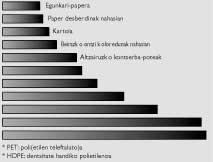Expensive recycling?
A study recently conducted in the United States has made known what today costs Americans to recycle ordinary urban waste. As seen in the diagram above, paper and derivatives are the ones that are recycled cheaper, with plastic packaging being the most expensive. The data indicate the value of a ton of collected and recycled material.

The research is focused on market parameters such as soda. That is, it has been done without taking into account the other aspects (ecological) in favor of recycling.
According to these data, virtually all of the recycled products currently are not able to compete in the market for the unrecycled. Manufacturers find it even more economical to buy and transform raw materials (oil, wood, minerals...). However, the benefits of recycling are clear. Valuing these benefits is a political problem: the application of an "ecological tax" to certain raw materials would be sufficient to make recycled products competitive. There are also numerous improvements in waste collection and separation, which are an important part of the cost of recycling.
For example, as the dumping of rubbish to the river or on the edge of the road is currently prohibited, citizens could be prohibited from mixing all kinds of garbage. Finally, the orientation of technological research towards a lower cost of recycling should be a priority objective. If such measures were implemented, the numbers in the diagram would change radically.





